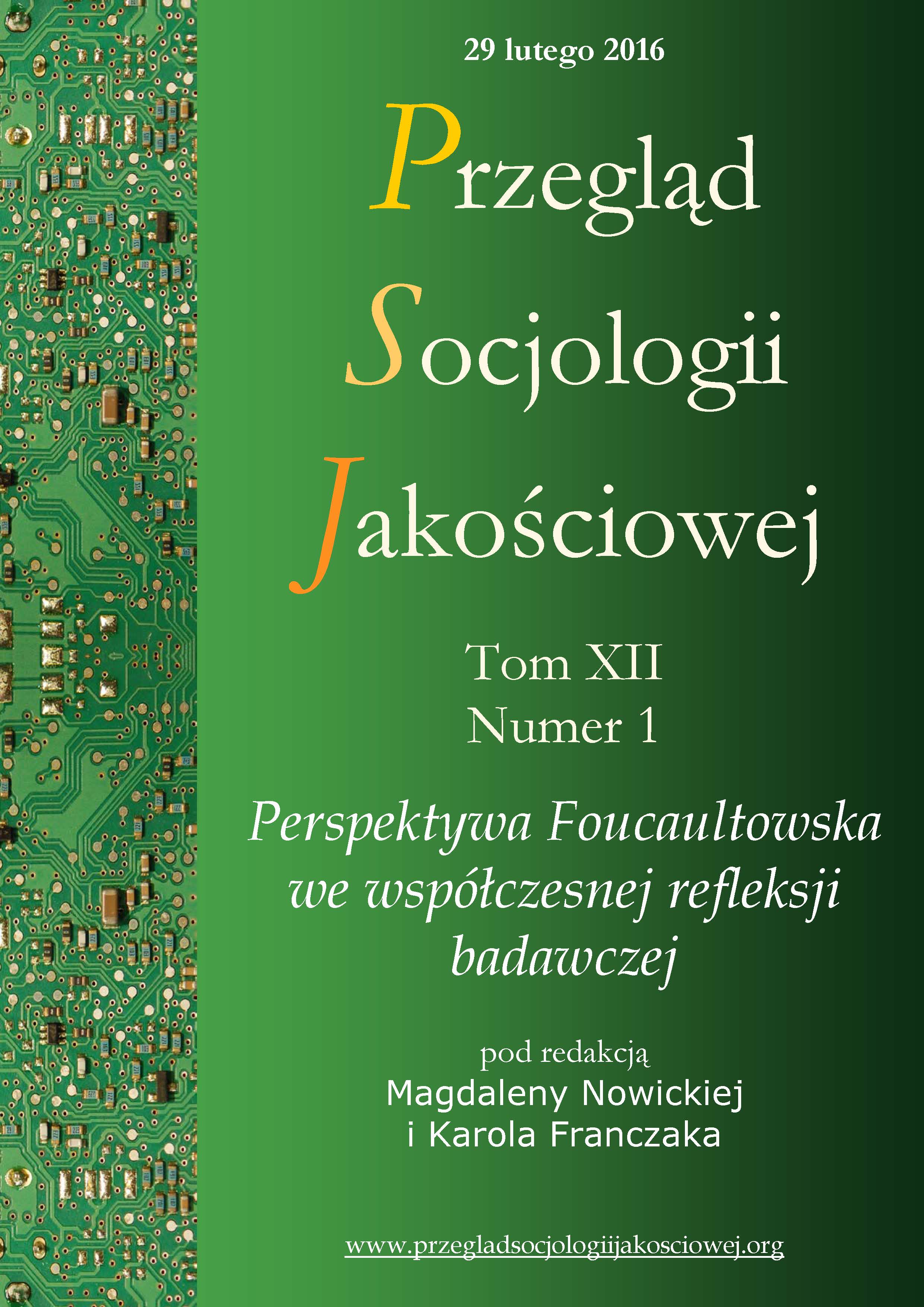Is Power Everywhere? A Critique of Two Justifications of Foucauldian Prevalence of Power Thesis
DOI:
https://doi.org/10.18778/1733-8069.12.1.08Keywords:
Michel Foucault, Power, Discourse, Social Theory, CritiqueAbstract
Michel Foucault is one of t hose authors who significantly impacted upon broadening the meaning of the term “power,” including realms in which one is to look for its symptoms. Foucault’s contribution to the developmental tendency within the studies of power is especially striking. In the History of Sexuality, Foucault was to openly claim that power was plainly everywhere. For years Foucault had been elaborating two ways of legitimizing this view, which is named here “a prevalence of power” thesis. For the sake of the below analysis, the first justification is going to be called historiosophical, and the second—social differentiation justification. The article aims at criticizing both of them and, although indirectly, the very thesis they support. Since the boundaries of all Foucauldian analytics of power are outlined by these two justifications, their reconstruction and critical consideration are of crucial importance for the post-Foucauldian current in social sciences.
Downloads
References
Althusser Louis (1972) Louis Althusser Replies to John Lewis. „Australian Left Review”, no. 12, s. 23–36.
Google Scholar
Bourdieu Pierre (2001) Reguły sztuki. Przełożył Andrzej Zawadzki. Kraków: Universitas.
Google Scholar
Burchell Graham, Gordon Colin, Miller Peter (1991) The Foucault Effect. Chicago: The University of Chicago Press.
Google Scholar
DOI: https://doi.org/10.7208/chicago/9780226028811.001.0001
Czyżewski Marek (2005) Dyskurs [ w:] Władysław Kwaśniewicz, red., Encyklopedia socjologii, t. Suplement. Warszawa: Oficyna Naukowa, s. 50–58.
Google Scholar
Czyżewski Marek (2012) Wiedza specjalistyczna i praktyka społeczna – przemiany i pułapki [w:] Arkadiusz Jabłoński, Jan Szymczyk, Mariusz Zemło, red., Kontrowersje dyskursywne. Między wiedzą specjalistyczną a praktyką społeczną. Lublin: Wydawnictwo Katolickiego Uniwersytetu Lubelskiego, s. 71–93.
Google Scholar
Czyżewski Marek (2013) Teorie dyskursu i dyskursy teorii. „Kultura i Społeczeństwo”, nr 2, s. 4–25.
Google Scholar
Ferguson Adam (1782) An Essay on the History of Civil Society. London: T. Cadell.
Google Scholar
Foucault Michel (1968) Réponse au Cercle d’épistémologie. „Cahiers pour l’analyse”, no. 9, s. 9–40.
Google Scholar
Foucault Michel (1976) Histoire de la sexualité. Paris: Gallimard.
Google Scholar
Foucault Michel (1979) Useless to Revolt [w:] James D. Faubion, ed., Power. The Essential Works of Foucault, 1954–1984. New York: The New Press, s. 449–453.
Google Scholar
Foucault Michel (1993) Nadzorować i karać. Narodziny więzienia. Przełożył Tadeusz Komendant. Warszawa: Aletheia Spacja.
Google Scholar
Foucault Michel (1995) Historia seksualności. Przełożyli Bogdan Banasiak, Tadeusz Komendant, Krzysztof Matuszewski. Warszawa: Czytelnik.
Google Scholar
Foucault Michel (1997) The Politics of Truth. Los Angeles: Semiotext( e).
Google Scholar
Foucault Michel (1998) Trzeba bronić społeczeństwa. Przełożyła Małgorzata Kowalska. Warszawa: Wydawnictwo KR.
Google Scholar
Foucault Michel (2000) The Ethics of the Concern of the Self as a Practice of Freedom [w:] Paul Rabinow, ed., Ethics, Subjectivity and Truth: The Essential Works of Michel Foucault 1954–1984. New York: The New Press, s. 281–301.
Google Scholar
Foucault Michel (2004) Sécurité, territoire, population. Cours au Collège de France 1977–1978. Paris: Gallimard Seuil.
Google Scholar
Foucault Michel (2005) Hermeneutics of the Subject. Lectures at the Collège de France, 1981–82. New York: Palgrave Mac-Millan.
Google Scholar
DOI: https://doi.org/10.1007/978-1-137-09483-4
Foucault Michel (2010) Bezpieczeństwo, terytorium, populacja. Przełożył Michał Herer. Warszawa: Wydawnictwo Naukowe PWN.
Google Scholar
Foucault Michel (2011) Narodziny biopolityki. Przełożył Michał Herer. Warszawa: Wydawnictwo Naukowe PWN.
Google Scholar
Garfinkel Harold (1984) Racjonalne cechy działalności naukowej i potocznej [w:] Edmund Mokrzycki, red., Kryzys i schizma. Przełożyła Dorota Lachowska. Warszawa: Państwowy Instytut Wydawniczy, s. 193–220.
Google Scholar
Habermas Jürgen (2000) Filozoficzny dyskurs nowoczesności. Przełożyła Małgorzata Łukasiewicz. Kraków: Universitas.
Google Scholar
Lemke Thomas (2007) Foucault, rządomyślność, krytyka. Przełożył Jakub Maciejczyk. „Recykling Idei”, nr 9, s. 40–48.
Google Scholar
Milchman Allan, Rosenberg Allan (2009) The Final Foucault: Government of Others and Government of the Self [w:] Binkley Sam, Capetillo Jorge, eds., A Foucault for the 21st Century: Governmentality, Biopolitics and Discipline in the New Millennium. Newcastle upon Tyne: Cambridge Scholars Publishing, s. 62–72.
Google Scholar
Rorty Richard (1993) Moralna tożsamość a prywatna autonomia: przypadek Foucaulta. Przełożył Marek Kwiek. „Etyka”, nr 26, s. 125–132.
Google Scholar
DOI: https://doi.org/10.14394/etyka.758
Rose Nikolas (1998) Inventing Our Selves. Psychology, Power, and Personhood. Cambridge: Cambridge University Press.
Google Scholar
Rose Nikolas (1999) Powers of Freedom. Reframing Political Thought. Cambridge: Cambridge University Press.
Google Scholar
DOI: https://doi.org/10.1017/CBO9780511488856
Stachowiak Jerzy (2012) Analiza relacji władzy w konkurencyjnych perspektywach Noama Chomsky’ego i Michela Foucault. „Studia Socjologiczne”, nr 1(204), s. 93–110.
Google Scholar
Veyne Paul (1988) Ostatni Foucault i jego moralność. „Literatura na Świecie”, nr 6(203), s. 321–329.
Google Scholar
Veyne Paul (2010) Foucault. Cambridge: Polity Press.
Google Scholar
Downloads
Published
How to Cite
Issue
Section
License

This work is licensed under a Creative Commons Attribution-NonCommercial-NoDerivatives 4.0 International License.














